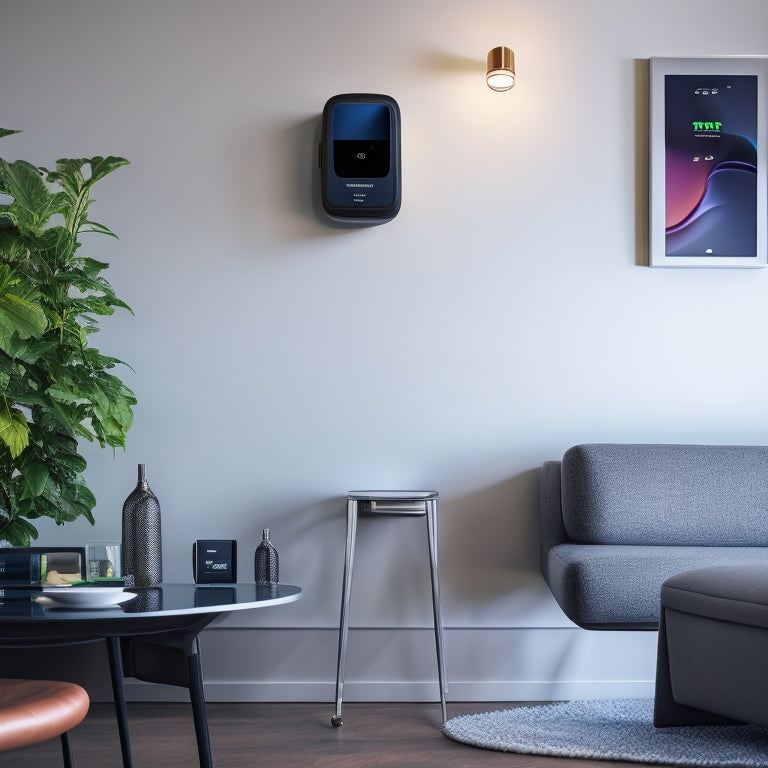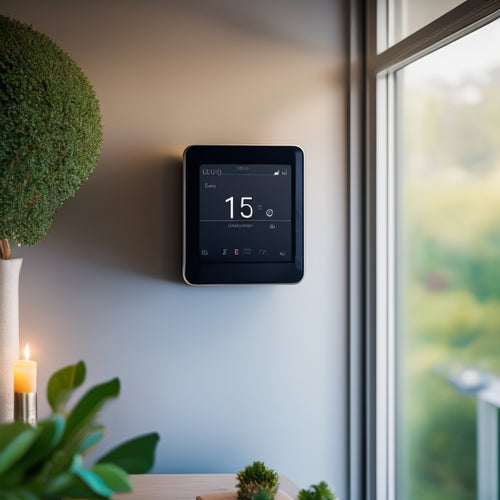
7 Best EV Battery Health Trackers for Homeowners
Share
You can maximize your electric vehicle's performance and lifespan by leveraging advanced battery health trackers that provide real-time monitoring, smart diagnostics, and personalized maintenance tips to prevent capacity loss and optimize charging habits. These devices track your EV's state, including battery capacity loss, in real-time, offering smart battery health diagnostics and accurate range predictions. They also provide real-time charging analytics, optimizing your charging routine and reducing energy waste. With features like battery degradation alerts and range estimation tools, you'll be able to make informed decisions to extend your EV's battery life and performance - and there's more to investigate on how to get the most out of your EV.
Key Takeaways
- Real-time operational data from onboard sensors and software helps optimize charging habits and improve efficiency through detailed performance breakdowns.
- Advanced algorithms in smart battery health diagnostics detect performance anomalies, providing early detection of degradation and personalized maintenance tips.
- Battery degradation alerts systems monitor capacity and alert users to critical thresholds, tracking overall health and performance metrics.
- Accurate range predictions rely on understanding factors like driving habits, terrain, and weather, which impact EV range and facilitate better charging station selection.
- Integrating machine learning and real-time data enhances prediction accuracy, providing a reliable baseline for future range predictions and informed energy management decisions.
Monitoring Your EV's State
Through a combination of onboard sensors and advanced software, electric vehicles (EVs) provide owners with real-time observations into their car's operational state, allowing for more informed decision-making and proactive maintenance.
By conducting energy audits and load profiling, you can optimize your charging habits and identify areas for improvement, similar to assessing fleet energy demands.
You can access this data through the user interface, which provides a detailed breakdown of your EV's performance. By monitoring your charging habits, you can identify areas for improvement, optimizing your energy consumption and reducing your carbon footprint.
The user interface also allows you to set custom notifications, alerting you to any issues that require attention.
With this level of transparency, you're enabled to take control of your EV's health, making data-driven decisions to guarantee your vehicle runs at peak performance.
Track Battery Capacity Loss
Your EV's battery capacity is a vital aspect of its overall health, and tracking its loss is necessary to maintaining peak performance. You need to keep a close eye on your battery's capacity to guarantee it's operating within ideal ranges.
This is especially important when considering the benefits of solar-powered EV charging, which can reduce carbon footprint and grid reliance. Additionally, fast charging stations can recharge up to 80% in under 30 minutes, making it essential to monitor your battery's capacity to minimize downtime.
This is where a reliable battery health tracker comes in.
- State of Health (SoH): This measures your battery's capacity relative to its original specs.
- State of Charge (SoC): This tracks your battery's current charge level, helping you identify capacity loss.
- Cycle Count: This indicator shows how many charge cycles your battery has gone through, which affects its overall capacity.
- Capacity Loss Rate: This helps you identify if your battery is losing capacity at an alarming rate, indicating potential issues.
Real-time Charging Analytics
As you monitor your EV's battery capacity loss, you'll also want to keep tabs on its charging habits.
Real-time charging analytics give you a deeper understanding of your EV's energy consumption, allowing you to optimize your charging routine for maximum efficiency.
By integrating solar energy into your charging setup, you can reduce grid reliance and generate clean energy, reducing your carbon footprint.
You'll be able to track charging efficiency, identifying areas where energy is being wasted and making adjustments to reduce your carbon footprint.
Advanced energy management features will also help you schedule charging sessions during off-peak hours, taking advantage of lower electricity rates and reducing your energy bills.
With real-time charging analytics, you'll have the freedom to take control of your EV's energy usage, making informed decisions that benefit both your wallet and the environment.
Smart Battery Health Diagnostics
Enabled by advanced algorithms and machine learning, smart battery health diagnostics scrutinize your EV's battery performance, pinpointing subtle anomalies and warning signs of potential issues before they escalate into major problems.
This proactive approach enables you to take control of your EV's battery maintenance, ensuring peak performance and extending its lifespan. By monitoring real-time battery state of charge and adjusting charging habits accordingly Ideal SOC Levels, you can prevent overcharging and undercharging, which can greatly impact battery health.
Regularly logging battery performance also helps detect anomalies and informs maintenance decisions.
Some key benefits of smart battery health diagnostics include:
- Early detection of battery degradation: Identify capacity loss and take corrective action to prevent further decline.
- Personalized battery maintenance tips: Receive customized advice on how to enhance your charging habits and driving style.
- Accurate diagnostic tools: Utilize advanced analytics to pinpoint the root cause of battery-related issues.
- Data-driven information for informed decision-making: Make informed choices about your EV's battery maintenance and potential upgrades.
Optimizing Your EV's Performance
You'll want to keep a close eye on your energy usage to optimize your EV's performance, as excessive consumption can lead to premature battery degradation.
By monitoring your energy usage patterns, you can identify areas for improvement and make data-driven decisions to reduce your carbon footprint.
Additionally, maximizing your savings on fuel costs, which can be up to $14,500 over 15 years Fuel Cost Savings, can also contribute to the overall affordability of your EV.
Monitor Energy Usage
Most electric vehicle owners understand that monitoring energy usage is vital to optimizing their EV's performance.
By tracking your energy consumption, you can identify areas where you can improve your driving habits and reduce your carbon footprint.
Here are some key aspects of your energy usage to monitor:
-
Daily energy consumption: Keep an eye on how much energy you're using daily to identify patterns and anomalies.
-
Usage patterns: Analyze your energy usage patterns to understand when and where you're consuming the most energy.
-
Charging habits: Monitor your charging habits to make sure you're charging efficiently and not wasting energy.
- Battery health: Keep tabs on your battery's state of health to prevent degradation and extend its lifespan.
Extend Battery Life
As you monitor your energy usage, you're likely wondering how to extend the life of your EV's battery.
Optimize your charging habits by avoiding extreme temperatures, as high heat can degrade your battery. Keep your battery level between 20% and 80% if possible, and try to charge your EV when the battery is cool.
Additionally, adopt good battery maintenance tips, such as updating your vehicle's software regularly and avoiding deep discharging.
Limit your use of DC Fast Charging, as it can cause wear on your battery.
Battery Degradation Alerts System
One of the most critical features of an EV battery health tracker is its battery degradation alerts system, which monitors your battery's capacity and alerts you when it falls below a certain threshold.
This feature guarantees you're always on top of your battery health, giving you the freedom to plan and optimize your charging habits accordingly.
The system provides you with essential degradation metrics, including:
- Capacity loss percentage: Tracks the percentage of battery capacity lost over time.
- State of Health (SoH): Measures your battery's overall health and performance.
- State of Charge (SoC): Monitors your battery's current charge level.
- Depth of Discharge (DOD): Calculates the battery's depth of discharge, helping you identify areas for improvement.
Accurate Range Predictions Tool
Three key factors - driving habits, terrain, and weather - greatly impact your electric vehicle's range, making it challenging to accurately predict how far you can go on a single charge. To overcome this, you need an accurate range predictions tool that utilizes predictive analytics to provide reliable range estimation.
| Tool | Range Estimation Method | Accuracy |
|---|---|---|
| EVTripPlanner | Machine learning-based | ±10 miles |
| PlugShare | Real-time traffic and weather data | ±5 miles |
| EVNotify | Historical driving data analysis | ±15 miles |
| ChargeHub | Crowdsourced data from EV owners | ±12 miles |
| EVRange | Advanced algorithm with multiple data sources | ±3 miles |
These tools use various methods to estimate your EV's range, providing you with the freedom to plan your trips with confidence.
Frequently Asked Questions
Can I Track My Ev's Battery Health Without Wi-Fi Connectivity?
You can still monitor your EV's battery health without Wi-Fi connectivity, thanks to offline-capable devices that employ advanced battery management systems, allowing you to track essential metrics and receive alerts through offline monitoring, giving you freedom from connectivity constraints.
Are EV Battery Health Trackers Compatible With All Electric Vehicles?
You're steering through the EV terrain like a captain charting new waters, and you wonder: are EV battery health trackers compatible with all electric vehicles? Thankfully, most trackers are designed to be versatile, ensuring seamless EV compatibility, which ultimately enhances battery longevity.
Do I Need Technical Expertise to Install an EV Battery Health Tracker?
You don't need extensive technical knowledge to install an EV battery health tracker, as most devices come with user-friendly manuals outlining specific installation requirements, making it a relatively straightforward process that you can handle on your own.
Can I Use an EV Battery Health Tracker on Multiple Vehicles?
You can use an EV battery health tracker on multiple vehicles, thanks to its multi-vehicle compatibility feature, which guarantees tracking accuracy isn't compromised, allowing you to monitor and optimize battery performance across your entire fleet with ease.
Are EV Battery Health Trackers Suitable for Commercial or Fleet Use?
You'll find that most EV battery health trackers are designed for personal use, but some advanced models cater to commercial applications, offering scalable fleet management solutions that help you optimize battery performance across your entire fleet.
Related Posts
-

What Does Your Home Energy Audit Report Reveal?
Your home energy audit report reveals a detailed analysis of your energy consumption patterns, highlighting areas of ...
-

7 Best Cool Roof Rebates for Energy-Savvy Homeowners
You're an energy-savvy homeowner looking to install a cool roof, and you're wondering which rebates can help you save...
-

Smart Energy: Greener Homes With Connected Power Devices
You can control and optimize your energy consumption with smart energy devices, reducing your carbon footprint by up ...


